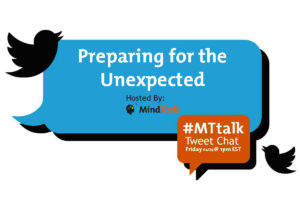 Life is unpredictable. During the past 10 years we’ve witnessed major banking institutions close down. We’ve seen terror attacks we never imagined would happen. Hackers have broken into the databases of big companies. While we can’t prevent such things from happening, we don’t want to be left thinking, “If only we’d been more prepared” when they do.
Life is unpredictable. During the past 10 years we’ve witnessed major banking institutions close down. We’ve seen terror attacks we never imagined would happen. Hackers have broken into the databases of big companies. While we can’t prevent such things from happening, we don’t want to be left thinking, “If only we’d been more prepared” when they do.
The topic for our latest #MTtalk Twitter chat, held on Friday (April 29), was “Preparing for the Unexpected.” More than 40 people participated in the hour-long event and shared more than 500 tweets. It was clear that all our participants had one thing in common: they have dealt with a workplace crisis at some point.
Here are the questions and some of the responses from the chat.
Question 1: What do you think of when you hear “unexpected event?”
@temekoruns: “First thing I think of is an event that you have absolutely no plan in place for.”
@MituSamar: “‘Unexpected event’ in corporate set-up relates to crisis situation. So first thing I think about are affected stakeholders.”
Question 2: How can you prepare for something that you’re not expecting?
@KrisGiere: “Build a capacity for change & adaptation. Rigid processes or attitudes break under unexpected stress.”
@NootsCaboots: “Develop a list of ‘worse case scenarios’ and put a plan in place to tackle each issue.”
Question 3: What are some of the unexpected workplace events you’ve experienced?
@Dwyka_Consult: “Hearing over the radio that the bank I worked for merged with 3 other banks.”
@harrisonia: “I remember one job where they downsized me and 3 months later I found they went out of business. (I saw it as KARMA!)”
Some other events included the death of a colleague, downsizing, restructuring, and key team members handing in 24-hours’ notice.
Question 4: What impact did these events have on you, your job and/or your career?
@MicheleDD_MT: “Every time there was a restructure, more was piled on. You just had to cope.”
@Triumph_LA: “I believe that challenges, especially in the workplace, make you (and your team) smarter and stronger.”
Question 5: When trying to deal with an unexpected event in the past, what went wrong?
@Dwyka_Consult: “I tried to fix everything on behalf of everybody… and I couldn’t – and felt like a terrible failure.”
@temekoruns: “Lack of positivity, communication, and the tendency to complain instead of problem solve.”
Question 6: Looking back, what is the one thing you would not do again and why?
@Midgie_MT: “Would not be negative re the changes as this does nothing to help. It closes down your mind to possibilities.”
@ZalkaB: “No regrets, they don’t work. I would never ever compromise my health or wellbeing for anything, especially work.”
Thinking that the worst won’t happen and not having a plan B were common themes too.
Question 7: What habits do you need to change in order to deal with unexpected events in the future?
@KrisGiere: “I need to work on being kinder & more patient with myself. I often wear myself down, trying to carry the burden.”
@harrisonia: “Find balance between contingency plans & pessimism. THIS is not easy.”
Question 8: What skills have you developed as a result of having experienced unexpected events?
@stevead64: “My instinct became sharper and I became more proactive.”
@Triumph_LA: ” I learned that we are responsible for making bad situations into positive lessons. And that has helped me start my own business.”
Question 9: What helps you to maintain a positive attitude when unexpected events occur?
@MituSamar: “The thought: ‘This too shall pass’.”
@Triumph_LA “I think about this quote: ‘A ship in port is safe, but that’s not what ships are built for’.”
Question 10: What one thing would you recommend to others to help them prepare for an unexpected event?
@harrisonia: “To help others prep for unexpected events, SHARE best practices.”
@ZalkaB: “Don’t look for whys & why me. Get up, brush yourself off, just keep moving.”
During our next #MTtalk chat, we’ll be talking about the realities of workplace learning. Join us next Friday (May 13) at 1pm EST (5pm GMT), when we’re discussing, “Workplace Learning – Fact or Fantasy?” We’d love to hear your thoughts and ideas!
To join the chat, type #MTtalk in the Twitter search function. Tap on ‘All Tweets’ and you’ll be able to follow the chat feed live. To participate, simply include #MTtalk in your tweet and it will show up in the chat feed.
In the meantime, here are some more Mind Tools resources on dealing with unexpected events, which we hope you’ll find useful!


